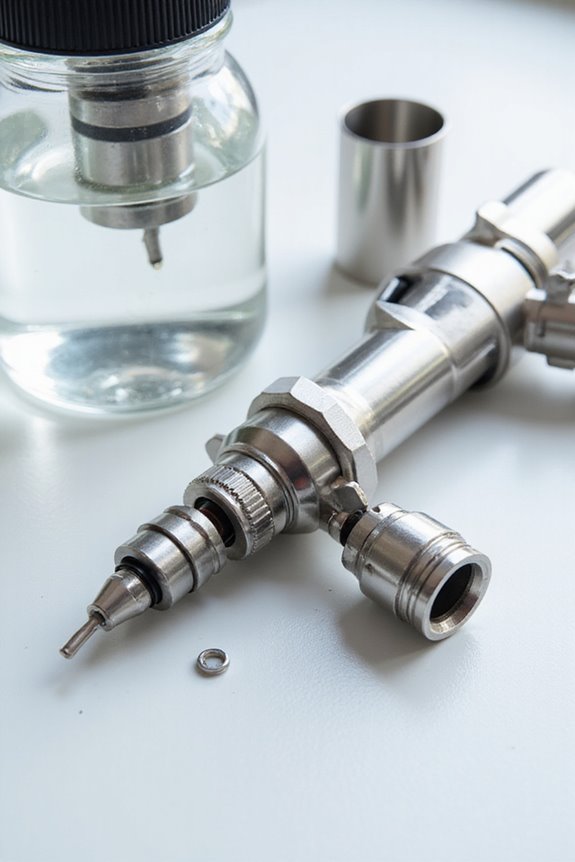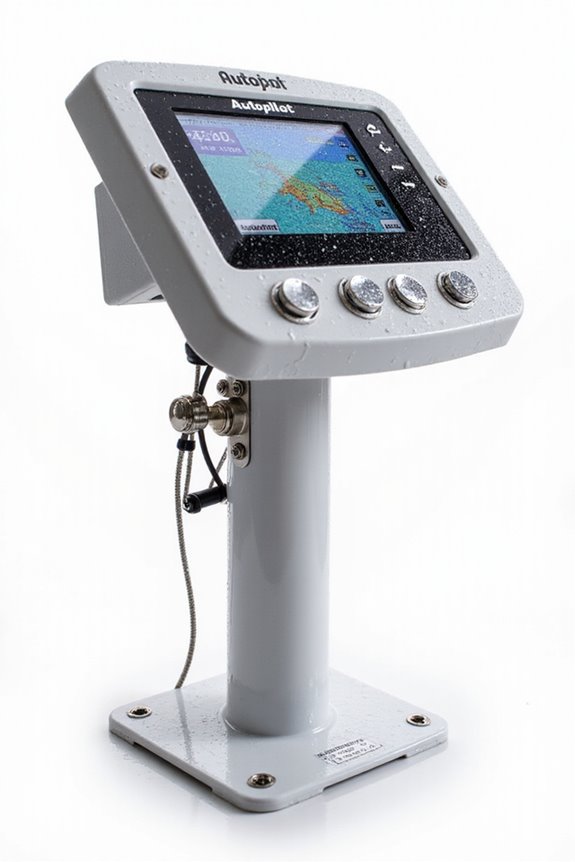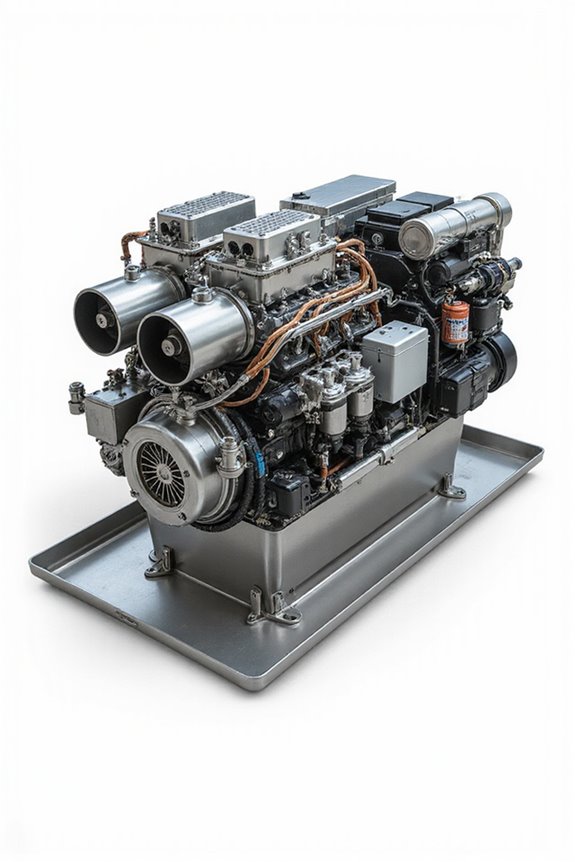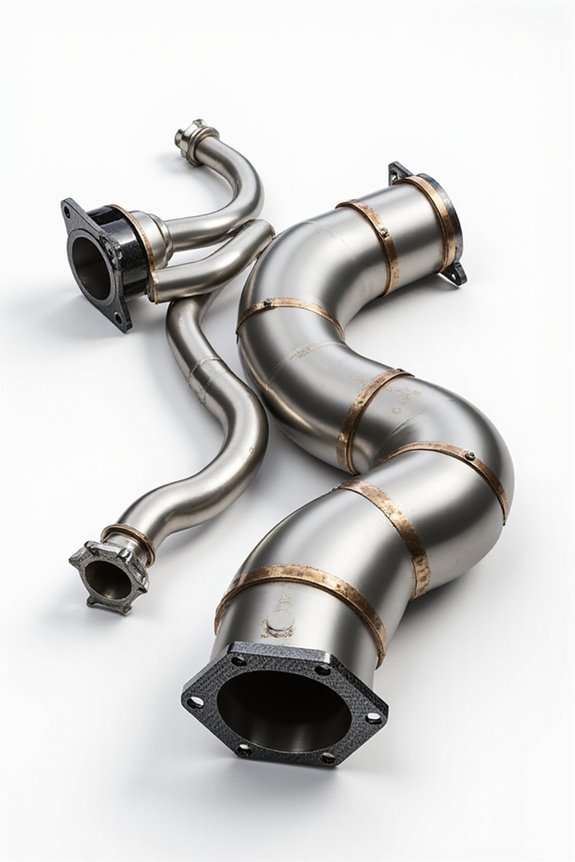Keeping your boat’s fuel injectors clean is key to smooth engine runs and saving fuel—nobody wants rough idling or unexpected breakdowns while out on the water, right? Dirty injectors cause clogs and leaks, which can waste gas and even damage your engine. Ultrasonic cleaning or quality chemical additives help clear stubborn deposits, boosting performance and longevity. Plus, professional services offer thorough diagnostics to catch sneaky issues early. Curious about tackling these challenges? Stick around and we’ll cover more tips and tricks.
Key Takeaways
- Regular fuel injector cleaning prevents clogged nozzles, ensuring smooth idling and improved fuel efficiency for boats.
- Ultrasonic cleaning uses sound waves and special solutions to deeply remove deposits from injectors for better spray patterns.
- Using marine-specific chemical additives prevents gum buildup, rust, and corrosion in fuel injectors during boat operation.
- Professional cleaning services offer injector diagnostics, flow testing, and seal replacements to maintain optimal engine performance.
- Neglecting fuel injector maintenance can cause rough idling, poor acceleration, and increased fuel consumption in marine engines.
Importance of Fuel Injector Cleaning in Marine Engines
Even if you’re not a marine mechanic, you’ve probably guessed that clean fuel injectors are pretty important for your boat’s engine to run right. When those tiny nozzles deliver fuel in an ideal spray pattern, it helps the engine burn fuel more efficiently—meaning better fuel efficiency and less wasted gas. Who doesn’t like saving a few bucks at the pump? Plus, keeping injectors clean supports smoother engine operation and reduces wear on parts like pistons and valves, boosting engine longevity. Think of it as giving your boat’s heart a little TLC. Neglecting this can lead to rough idling and poor acceleration. So, regular cleaning isn’t just maintenance—it’s a way to keep your time on the water enjoyable and your engine humming happily for the long haul.
Common Fuel Injector Problems in Boats
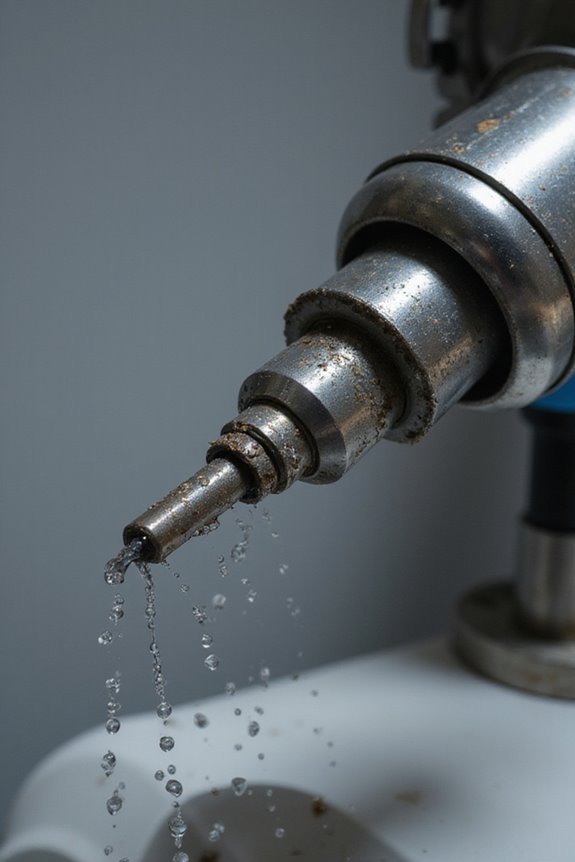
When it comes to keeping our boats running smoothly, fuel injectors play a key role—but they’re not immune to problems. Clogged nozzles from fuel impurities or debris can really bog down performance, causing rough idling and higher fuel use. Ever notice your boat sputtering? It might be a sign your injector maintenance is overdue. Then there’s injector leaks—damaged seals can cause fuel seepage, creating fire hazards and messing with engine lubrication. Pressure issues add another twist; too low or too high fuel pressure disrupts injection, leading to smoke and poor combustion. Electrical faults and corrosion also join the party, throwing off fuel timing or wearing down injector components. Staying on top of injector and fuel system checks keeps these gremlins at bay—because who wants surprise engine trouble on the water?
Ultrasonic Cleaning Methods for Fuel Injectors
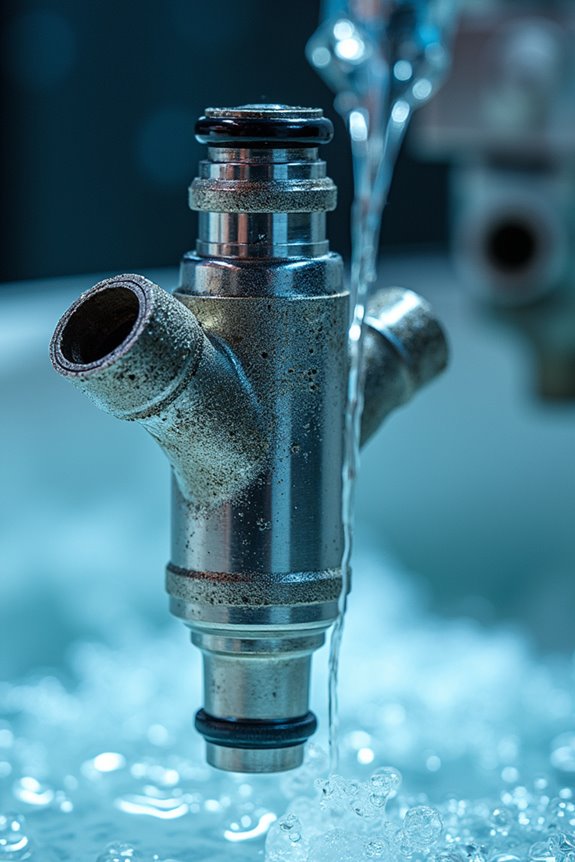
Although fuel injectors might seem like tiny parts, they have a big job to keep our boat engines running smoothly—and cleaning them properly is key. That’s where ultrasonic cleaning methods come in. By immersing injectors in a bath filled with special cleaning solutions and subjecting them to ultrasonic frequency sound waves, we get super-heated bubbles that gently scrub away stubborn deposits. It’s kind of like a power wash but for injectors! Plus, some machines pulse the cleaning fluid backward through the injectors to reach every nook. Not only does this remove gunky build-up, but it also improves the spray pattern—meaning better fuel efficiency and fewer headaches. Sure, professional ultrasonic cleaners aren’t cheap, but can you really put a price on smooth sailing?
Effective Chemical Additives for Injector Maintenance
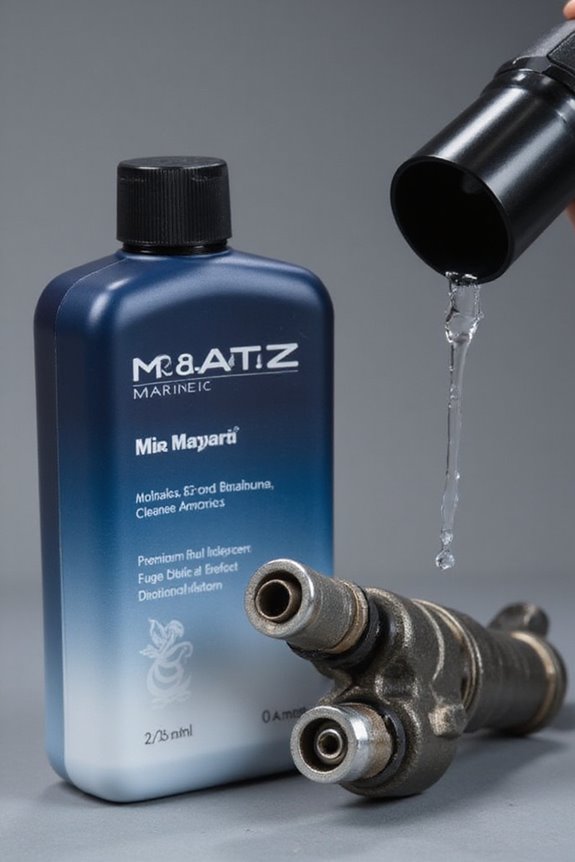
There’s a whole range of chemical additives out there designed to keep your boat’s fuel injectors in tip-top shape, and trust me, they’re worth knowing about. Additives like polyether amines tackle stubborn deposits, while synthetic blends clean and lubricate injectors, boosting additive effectiveness and extending injector longevity. Fuel stabilizers keep fuel fresh, preventing sticky gum buildup, and rust inhibitors protect against salty air’s nasty surprises. Water dispersants handle unwanted moisture, a common marine issue. Using these additives regularly isn’t just smart maintenance—it’s like giving your engine a little insurance policy against breakdowns. Plus, marine-specific formulas are tailored for watercraft challenges, promising smoother rides and fewer headaches. So, next time you fuel up, think about what these hardworking additives can do beneath the surface. Your injectors—and your boating buddies—will thank you.
Step-by-Step Guide to Manual Fuel Injector Cleaning
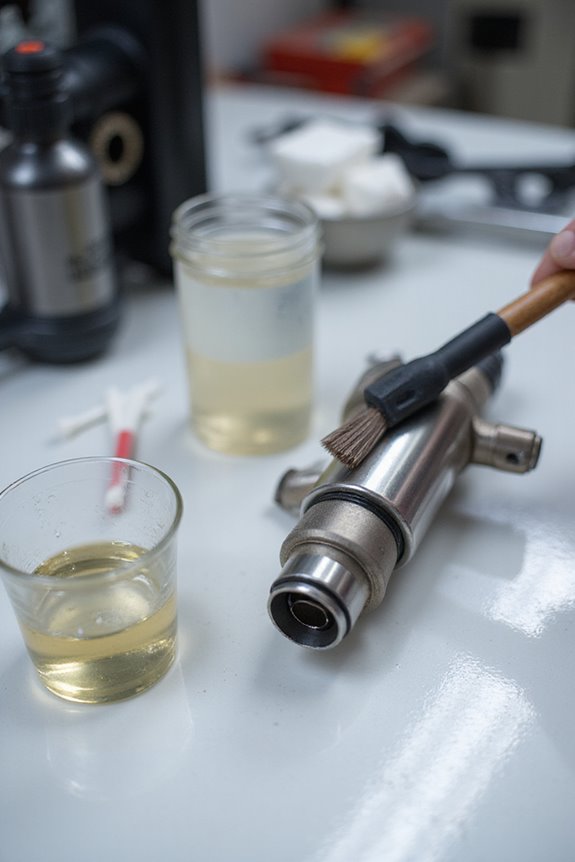
Before diving into the actual cleaning, let’s get our gear and workspace in order—because trust me, a messy setup only makes this chore harder than it needs to be. Gather your air compressor, jumper wires, cleaning solution, and protective gloves, then set up in a well-ventilated area. We start by carefully removing the injectors from the engine and disconnecting fuel lines and electrical connections—safety first! Using manual cleaning techniques, we’ll pulse voltage with a battery to mimic injector firing, letting the cleaning solution flush out gunk. Compressed air helps clear stubborn blockages, and don’t forget to watch that spray pattern—it’s like the injector’s report card. After rinsing thoroughly, reinstall everything, ensuring clips and connectors are secure. Remember, these injector maintenance tips keep our boat running smooth and ready for any adventure.
Challenges of Marine Fuel Injectors and How to Overcome Them
Okay, now that we’ve got the manual cleaning steps down, it’s time to talk about what makes marine fuel injectors a bit tricky to handle. These little parts face challenges like clogging from impurities in fuel, leaks from damaged seals, and even electrical hiccups disrupting timing. Ever wondered why injector longevity feels like a guessing game? Poor fuel quality plays a big role—contaminated or water-laden fuel wears down injectors faster, leading to misfires or black smoke. Plus, incorrect fuel pressure can mess with performance, making us all wish for simpler days! But understanding these challenges helps us stay ahead. We’re in this together, so knowing what can go wrong is the first step toward keeping our injectors—and boats—running smoothly for years.
How to Ensure Optimal Injector Performance
While it might seem tempting to ignore those tiny fuel injectors until they cause a real headache, staying on top of their care is actually the smartest move we can make. To guarantee peak injector performance, let’s commit to regular maintenance intervals for inspections and cleaning. Catching wear, leaks, or clogs early keeps our engines humming smoothly and prevents nasty surprises. Using quality fuel filters and checking fuel condition regularly also guards against contaminants that love to gum up injectors. We should keep fuel tanks clean and well-stored, too—think of it as giving injectors a spa treatment, minus the cucumber slices. By staying consistent with these simple steps, we prolong injector life and boost boat performance, making every trip on the water enjoyable rather than a test of patience. Who’s up for stress-free boating?
Professional Fuel Injector Cleaning Services for Boats
Getting professional fuel injector cleaning for boats might just be the secret weapon we didn’t know we needed to keep our engines running smoothly. These services use advanced cleaning techniques like ultrasonic cleaning to blast away stubborn deposits, something our DIY attempts rarely achieve. Plus, injector diagnostics and flow testing guarantee each injector performs at its best—kind of like a tune-up, but for fuel delivery. They often replace O-rings and filters too, preventing leaks and clogs that trip us up on the water. And with quick turnaround times, we’re not left waiting forever. Regular professional cleanings every few years help avoid tough symptoms like rough idling or harder startups. So why not trust the pros? Our engines will thank us, and our time on the water will be smoother and more enjoyable.
Frequently Asked Questions
Can Fuel Injector Cleaning Improve Boat Emissions Compliance?
They say, “An ounce of prevention is worth a pound of cure.” Together, we can meet emission standards and reduce environmental impact by cleaning fuel injectors—it’s key for staying compliant and protecting our shared waters.
How Long Does a Typical Fuel Injector Cleaning Take?
When we’re curious about cleaning duration, professional fuel injector cleaning usually takes 45 to 60 minutes. Keeping up with service frequency, like every 300 engine hours, helps us stay on top of maintenance together.
Are Proprietary Fuel Injector Cleaners Safe for All Marine Engines?
It is understood cleaning methods must match engine compatibility to keep our marine engines safe. Not all proprietary cleaners suit every engine, so let’s always check manuals and choose products designed specifically for our boat’s fuel system together.
What Are the Signs That Injectors Need Replacement Instead of Cleaning?
It’s understood when injector failure causes performance decline—like engine misfires, power loss, or erratic RPMs—it’s time to replace, not clean. Let’s trust these signs to keep our boats running smoothly, together as a community.
Can Fuel Injector Cleaning Extend the Boat’S Engine Warranty?
Imagine our warranty coverage as a delicate plant—we can’t expect it to grow just by watering injectors once. While cleaning is key to engine maintenance, it sadly won’t extend the warranty, but it does keep us covered.

